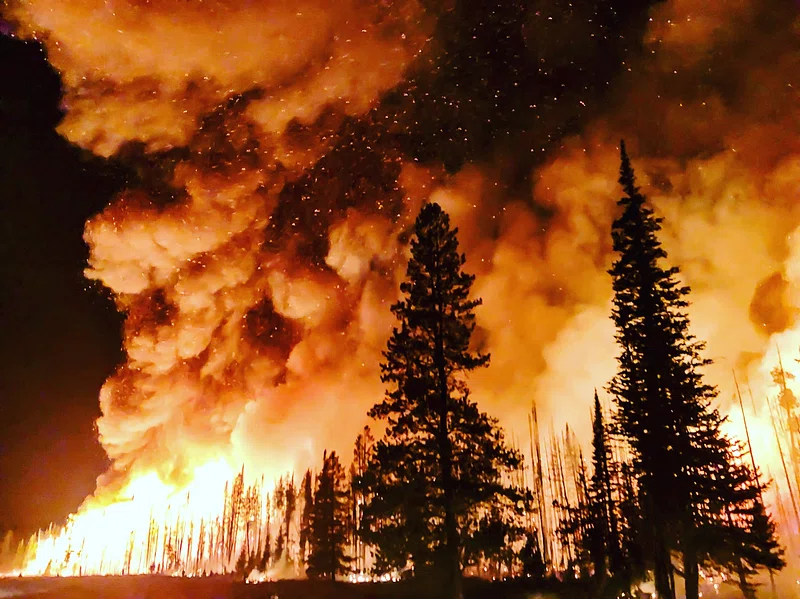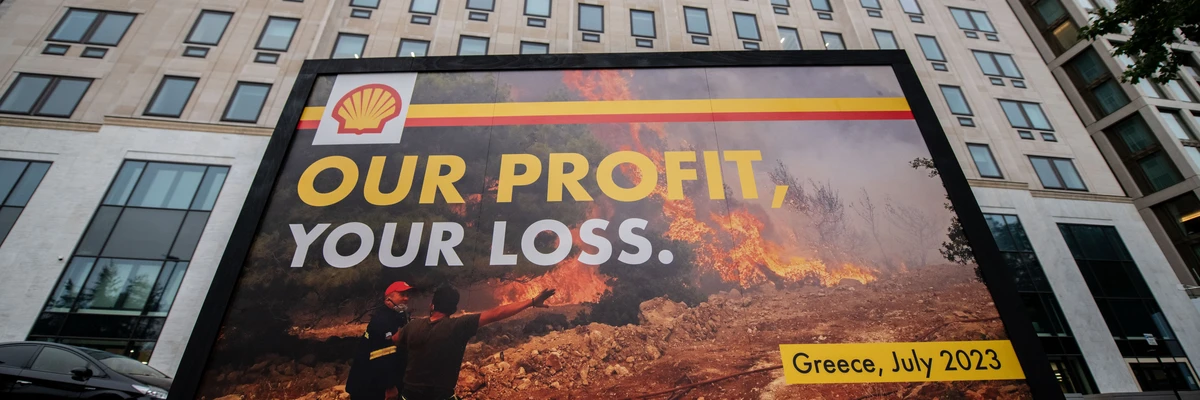US Billboard Campaign Blasts Fossil Fuel Giants for Causing Extreme Heat

(Photo: Fossil Free Media)
Original article by ULIA CONLEY republished from Common Dreams under Creative Commons (CC BY-NC-ND 3.0).
“From Alaska to Maui, our communities are struggling to survive the rapidly worsening impacts of the climate crisis, all the while, Big Oil is raking in billions at our expense.”
As about 111 million people in nearly two dozen states continued to face heat advisories, with temperatures reaching as high at 115°F in some cities, the nonprofit media lab Fossil Free Media unveiled a multicity campaign with one simple goal: ensuring that all Americans understand that the intense heatwaves across much of the country this summer have not been a natural phenomenon, but the result of continued fossil fuel extraction.
Starting Thursday drivers along stretches of highway in Phoenix, Arizona; Austin, Texas; and Fresno, California will pass by prominent billboards displaying a map of record-breaking temperatures that have been recorded across the U.S. this summer.
Fresno drivers will be reminded of a 109°F day in their city while those in Phoenix will see 117°F plastered over their hometown on the map, accompanied by the words, “Brought to you by Big Oil” and ThankYouBigOil.com.
That website redirects to Fossil Free Media’s (FFM) Stop the Oil Profiteering (STOP) project, where visitors can read about the estimated cost of climate-related disasters such as hurricanes, extreme heat, and wildfires—over $600 billion from 2016-20 alone—and the 5,000 people killed by such events in that same time period.
“The fossil fuel industry has known for decades that their products are fueling climate change and extreme weather, yet they have failed to act,” reads the website. “Instead, major oil and gas companies continue to invest billions into new projects that lock in decades more fossil fuel extraction while our communities take the heat… literally.”
Jamie Henn, director of the organization, said on social media that the public “needs to understand that this summer’s brutal heatwave was brought to you by Big Oil.”
The World Weather Attribution said last month that the heatwaves experienced by people across the U.S. and Europe in July would have been “virtually impossible” without the climate crisis, which scientists have for years said is being fueled by heat-trapping emissions from oil, gas, and coal extraction.
The organization also reported this week that wildfires in eastern Canada in recent weeks were made twice as likely by the climate emergency, which as STOP said, has created “tinderbox conditions” by making droughts longer and more intense.
“From Alaska to Maui, our communities are struggling to survive the rapidly worsening impacts of the climate crisis, all the while, Big Oil is raking in billions at our expense,” said Cassidy DiPaola, spokesperson for FFM and STOP. “There’s no denying that this summer’s brutal heatwaves are being fueled by the same Big Oil companies who are spreading climate disinformation and blocking much needed climate progress.”
More than 100 people in the U.S. have died of heat-related causes so far this year, and weather experts have continued to report high temperatures throughout August after July set a world record for the hottest month in recorded history.
Jennifer Falcon, a resident of Austin, told FFM that the climate crisis has emerged as an economic justice issue in her community as Texas broke its all-time record for power consumption last month, with people across the state struggling to stay cool.
“Texans are paying 800% more to cool their homes during the extreme heat that blankets our state,” she said. “This means choosing between food on the table or cooling your home to mitigate health impacts from the sweltering heat while Big Oil profits.”
As millions of people in the U.S. faced sweltering temperatures this summer—raising the risk of heat-related illness and even severe contact burns—ExxonMobil reported $7.9 billion in profits, its second-highest profit margin for a second quarter in over a decade.
Along with the billboards, STOP unveiled an ad showcasing the Big Oil’s link to the climate extremes Americans are increasingly at risk of facing.
“Record heatwaves? You can thank Big Oil for that,” said STOP. “Deadly wildfires? Yep, that’s Big Oil. Catastrophic storms? Smog-covered cities? You guessed it—Big Oil.”
The group is one of several scheduled to lead a March to End Fossil Fuels in New York City on September 17, with the rally being held as the United Nations holds a Climate Ambition Summit.
Aimed at pressuring U.S. President Joe Biden to declare a climate emergency, Fossil Free Media said the march is expected to be “the largest climate action since before the pandemic.”
Original article by ULIA CONLEY republished from Common Dreams under Creative Commons (CC BY-NC-ND 3.0).


